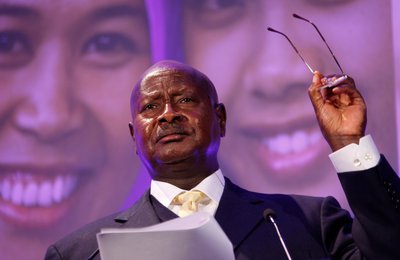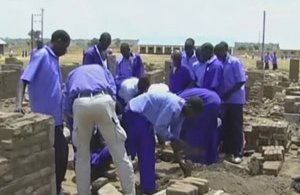http://www.youtube.com/watch?v=-Xy7SzSQgtQ
Following the screening of the documentary, Charles Odongtoo, the National Coordinator of Uganda Radio Network, led a panel discussion and audience question and answer session. The panel consisted of the following members: Gerald Karuhanga, Youth MP Representing Western Region; Norbert Mao, President General of the Democratic Party; Dr Arthur Beinomugisha, Executive Director at Advocates Coalition for Development and Environment; and David Pulkol, Executive Director at the African Leadership Institute.
'Uganda’s Black Gold' analysed the tension and sense of marginalization the residents of Hoima district have felt in their interactions with the Government of Uganda. Issues of job creation, displacement and compensation, environmental protection, and allegations of secret agreements were discussed in the film between Hoima residents and other key stakeholders. The film was created to spur dialogue around oil legislation, to avoid resource-based conflict and continue along a path of transitional justice. To date, no law currently exists on oil in Uganda.
“This is an important early warning video,” said Chairman Mao. “These are the issues, these are the issues around oil…An issue is something which is contentious.”
Mao expanded to lay out the five most important points for the Government to consider when moving forward on oil legislation and production: Trust, ownership, potential for conflict, environmental conflict, and local beneficiaries to local oil. Without open discussions and agreements between the residents and the government on these issues, Mao questioned whether the oil in Uganda would result in “prosperity for the majority or the few.”
“This issue can only be resolved if the government accommodates democratic debate,” Chairman Mao urged. “The debate should be public, not through caucuses where people are closed down.”
Karuhanga also focused on the importance of openness in the discussion between the President, Parliament, and citizens of Uganda. With many residents of Hoima concerned that they have not been kept up-to-date with the developments that affect their homes and livelihoods, Karuhanga echoed Mao’s warning.
“If there’s anything any person… should take seriously, it is the kind of opaqueness this government has exhibited in the oil sector, the way they don’t want anybody to know what is happening” he said. “I call upon everyone, let’s take interest, let’s press this government to be as transparent as possible.”
Karuhanga was confident, however, that the bill before Parliament would eventually be revised to form the best possible scenario for all parties involved. “We have already covered about three-quarters of the bill,” he said. “I can confidently report to you now, that the three-quarters we’ve covered, we have made the best proposals to this country.”
Pointing to a history of conflict and stagnancy in resource-rich countries such as the Democratic Republic of Congo, Gabon, Nigeria and Angola, Dr. Arthur Beinomugisha argued that Uganda had the choice to decide whether its oil would be a blessing or a curse. He urged Ugandan citizens to remain vigilant and for politicians to think independently, and argued that Ugandan oil can be a blessing if transparency and accountability are achieved. Ultimately, however, he urged that the government of Uganda to act with all citizens in mind.
“The legal regime should cater to the current generations, but also for the interests of the future generation,” he said. “This country has just emerged from conflict…the legal regime must ensure that the resources are well distributed and ensure regional development to avoid future conflicts.”
Pulkol also cited history, but throughout his speech he gave his doubts that the current regime could look at the past to provide a stable future. Referring to Uganda as suffering a “bush state”, in which old tendencies refused to make way for a new train of thought, Pulkol urged for a new direction in the country. “From poverty to power…from passive citizens to active citizenry,” he said.
Pulkol cited four key guidelines the government must follow in order for Uganda’s “black gold” to allow its citizens to prosper: Land ownership for the people; compulsory acquisition of land only for public use; adequate compensation to displaced citizens based on the market rate; and access to a court of law for any citizen who felt aggrieved at proceedings.
“I would love to leave this place as the most cheerful Ugandan, just give me the reasons,” he said. “Let me give you the evidence: The government is not disclosing to us what they are cooking. Secondly, allegations of corruption show that we are not going to negotiate from a position of strength…thirdly, the local citizens are being ignored…But we can still turn this around.”












